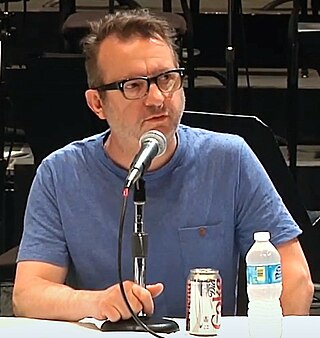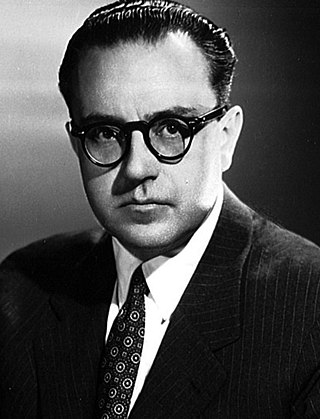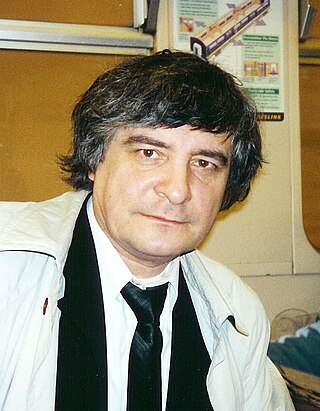
Mark-Anthony Turnage is an English composer of contemporary classical music.

Alberto Evaristo Ginastera was an Argentine composer of classical music. He is considered to be one of the most important 20th-century classical composers of the Americas.
Paul Seiko Chihara is an American composer.

The Concerto for Flute, Harp, and Orchestra in C major, K. 299/297c, is a concerto by Wolfgang Amadeus Mozart for flute, harp, and orchestra. It is one of only two true double concertos that he wrote, as well as the only piece of music by Mozart for the harp. The piece is one of the most popular such concertos in the repertoire, as well as often being found on recordings dedicated to either one of its featured instruments.
José Serebrier is a Uruguayan conductor and composer. He is one of the most recorded conductors of his generation.
David Horne is a Scottish composer, pianist, and teacher.

Barry Ernest Conyngham,, is an Australian composer and academic. He has over 70 published works and over 30 recordings featuring his compositions, and his works have been premiered or performed in Australia, Japan, North and South America, the United Kingdom and Europe. His output is largely for orchestra, ensemble or dramatic forces. He is an Emeritus Professor of both the University of Wollongong and Southern Cross University. He is former Dean of the Faculty of the Fine Arts and Music at the University of Melbourne.
Edna Phillips, later Edna Phillips Rosenbaum, was an American harpist long associated with the Philadelphia Orchestra and a teacher at the Philadelphia Conservatory of Music. Her most lasting contribution to the instrument was a body of works she commissioned as a soloist, including the concertos of Alberto Ginastera, Nicolai Berezowsky, Ernst Krenek, and Ernst von Dohnányi.
Benjamin Britten's Piano Concerto, Op. 13, is the composer's sole piano concerto.

Barbara Nissman is an American pianist. She is especially known for her interpretations and performances of the works of Alberto Ginastera and Sergei Prokofiev which feature prominently in her repertoire. She is also a writer and a producer of a new DVD series, and a guest clinician presenting concerts, master classes and lectures world-wide.
The Flute Concerto is a composition for solo flute and orchestra by the American composer Elliott Carter. The work was commissioned by Elena Bashkirova for the Jerusalem International Chamber Music. Carter began the composition in September 2007 and completed it in March 2008 at the age of 99. The piece was first performed at the Jerusalem International YMCA on September 9, 2008 by the flutist Emmanuel Pahud and the Jerusalem International Chamber Music Ensemble under the conductor Daniel Barenboim.
The Piano Concerto No. 1, Op. 28, is the first piano concerto by the Argentinian composer Alberto Ginastera. The work was commissioned by the Koussevitzky Foundation and was completed in 1961. It was first performed by the pianist João Carlos Martins and the National Symphony Orchestra conducted by Howard Mitchell in Washington, D.C., on April 22, 1961. The concerto was Ginastera's first composition for piano since his Piano Sonata No. 1, Op. 22, written in 1952. It is dedicated to the memory of Serge and Natalie Koussevitzky.
The Violin Concerto is a composition for solo violin and chamber orchestra by the American composer Ned Rorem. The work was commissioned by the Springfield Symphony Orchestra for the violinist Jaime Laredo and composed in 1984. It was first performed by Laredo and the Springfield Symphony Orchestra conducted by Robert Gutter in the Symphony Hall, Springfield, on March 30, 1985.
The Flute Concerto is a composition for solo flute and orchestra by the American composer Ned Rorem. The work was commissioned by the Philadelphia Orchestra and was composed between August 2001 and May 2002. Its world premiere was given by the flutist Jeffrey Khaner and the Philadelphia Orchestra conducted by Roberto Abbado at the Kimmel Center for the Performing Arts on December 4, 2003.
The Double Concerto is a composition for violin, cello, and orchestra by the American composer Ned Rorem. The work was commissioned by the Indianapolis Symphony Orchestra and composed between July 27, 1997, and April 1998. It was composed for the violinist Jaime Laredo and the cellist Sharon Robinson, who first performed the piece with the Indianapolis Symphony Orchestra conducted by Raymond Leppard in Indianapolis on October 15, 1998.
Air Music is a set of ten variations for orchestra by the American composer Ned Rorem. The work was completed in 1974 and was first performed by the Cincinnati Symphony Orchestra on December 5, 1975. The piece won the 1976 Pulitzer Prize for Music.
The Piano Concerto No. 2, Op. 39, is the second piano concerto by the Argentinian composer Alberto Ginastera. The work was commissioned by the Indianapolis Symphony Orchestra for the pianist Hilde Somer, to whom the concerto is dedicated. It was first performed by Somer and the Indianapolis Symphony Orchestra conducted by Izler Solomon on March 22, 1973.
Popol Vuh: The Creation of the Mayan World, Op. 44, is a symphonic poem in seven movements by the Argentine composer Alberto Ginastera. The work, which remains unfinished, was composed between 1975 and 1983. It was first performed by the St. Louis Symphony under the direction of Leonard Slatkin at Powell Hall in St. Louis on April 7, 1989.

The Triple Concerto No. 2, Op. 139, is a concerto for three instruments – violin, harp and double bass – and orchestra by Dmitri Smirnov, composed in 2003. It was premiered in the centenary concert of the London Symphony Orchestra on 26 May 2004, with principal players from the orchestra as soloists.





